Ireland's offshore wind industry has the potential to add at least €38 billion to the Irish economy over the lifetime of all installed wind farms, according to a new report from Wind Energy Ireland.
The delivery of 37GW of offshore energy is targeted by 2050 and the report claims the industry will require many more workers if the targets for the sector are to be achieved.
It highlights skills shortages in all aspects of wind energy development including planning, operation, maintenance and service.
It said the industry faces a unique set of challenges because of the absence of a large oil and gas industry in Ireland and the skills and resources that it would have provided.
There is a wide range of skills the wind industry is short of.
These are in environmental-management roles, electrical engineering, marine, civil, structural, geotechnical and mechanical engineering.
The report also refers to a severe global shortage of welders, fabricators and electrical technicians as well as offshore health and safety expertise.
It calls for Government funding to make it less risky for the industry to invest in upskilling the local workforce and relocation grants for those who move to Ireland to help plug short-term skills shortages in the offshore wind sector.

Statkraft is the largest producer of renewable energy in Europe. Its Managing Director in Ireland Kevin O'Donovan said that for Ireland to have more than 35% of its entire electricity generation come from renewable energy, the percentage of which is growing, is an incredible achievement.
"We will reduce our reliance on fossil fuels. We will reduce our emissions, we will bring price stability and, long term, cheaper electricity for our country," he said.
However, he said there is a global struggle for talent and a global struggle for equipment when it comes to decarbonizing the electricity grid system.
"All across Europe everyone is doing it, running a race to decarbonize their grid system. And the skill shortage is a real challenge for us," Mr O'Donovan added.
The Statkraft boss said it is very important that all of students in second level education, who care about the environment, understand that they can make a change, and they can make an impact by going into a career in renewable energy.
"Whether it be boys or girls. Whether they want to be engineers, accountants, technical people, or any other careers they want to get into. There are so many opportunities in renewable energy," he said.
Launching the report, Chief Executive of Wind Energy Ireland Noel Cunniffe said the sector is trying to make sure that it has the right people with the right skills at the right time to capture €38 billion of added value for the economy over the coming decades from offshore wind energy.
"We are looking for the government to establish a Skills Fund over the coming months to ensure the investment required in apprenticeship programs, third level training programs, and micro credential courses," Mr Cunniffe said.
"This is needed for training a new batch of planners, engineers, welders, electricians, and anyone that can involve themselves in the offshore wind energy," he said.
"There's a job for anybody in this sector," he added.
Mr Cunniffe said that if the required skilled workers are not trained in Ireland, then those jobs are going to go to Britain and elsewhere in Europe and end up having to be imported into Ireland.
"The opportunity for Ireland is incredible. Offshore wind energy can deliver not just lower carbon emissions and cheaper energy, but it can also create jobs and deliver a thriving green economy for Ireland," he said.
The report, which will be launched at the Wind Energy Ireland annual conference, has been welcomed by Minister for Further and Higher Education, Research, Innovation and Science, Simon Harris.








